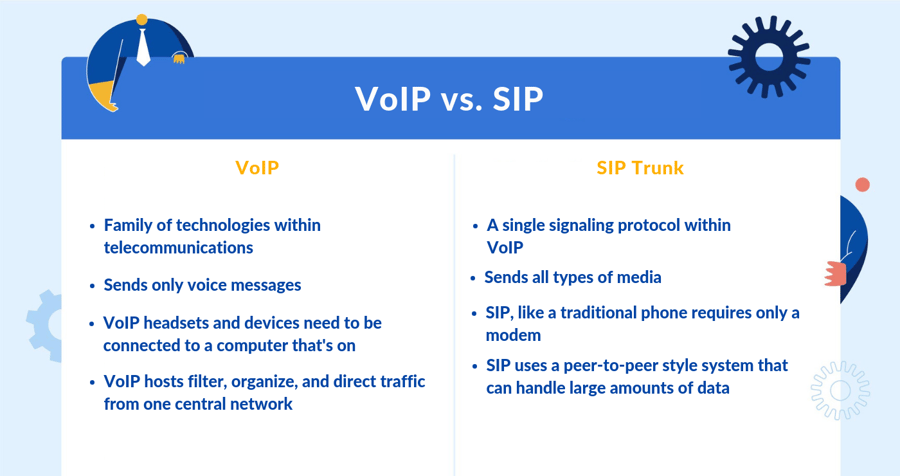If you’ve used VoIP before, you may have heard the terms SIP and SIP proxy. But what do these mean?
SIP stands for Session Initiation Protocol. It brings together many of the ‘building blocks’ needed to make phone calls via an internet connection (aka VoIP calls). Through SIP, a connection forms between endpoints.
Whether you’re a tech enthusiast interested in understanding how your online calls work or simply curious about the infrastructure behind VoIP technology, this article will provide a comprehensive primer on SIP proxies.
Let’s unpack how SIP proxies define communication behind the scenes.
What Is a SIP Proxy?
A SIP proxy is a type of server that routes Session Initiation Protocol (SIP) messages between user agents and other servers to establish communication sessions, such as voice or video calls over IP networks. It’s a key component for session management in IP telephony networks.

SIP proxies enable routing of signaling and session management in VoIP networks. They help route call setup signaling between VoIP network entities like user agent clients (softphones) and other servers (like registrars).
SIP proxy servers offer better authentication, authorization, network access control, call routing, reliable request retransmission, and security. They also enable features like call forking and redirecting SIP requests, allowing VoIP networks to handle many more users and sessions compared to centralized solutions.
This distributed approach avoids overloading any single server.
How SIP Proxies Work
SIP proxies are like air traffic controllers for real-time communications over the internet. They coordinate the connections for voice, video, and messaging between devices across a network.
Like an air traffic control tower at an airport, SIP proxies direct signaling messages to make sure sessions can start and that resources are available. This signaling protocol helps set up, route, control, and end media streams between endpoints.
For example, when you make a VoIP phone call, the SIP proxy signals that someone wants to connect with the caller, handles actions during the call like transferring or joining conferences, and releases the connection when finished.
SIP proxies also ensure high-quality connections by checking network availability and managing transcoding. Additionally, they authenticate users and balance loads across servers, optimizing system resources.
By smoothly directing the “traffic” of media packets for each session, SIP proxies enable clear and reliable unified communications over internet networks, just as air traffic control safely routes flights to their destinations.

Components of a SIP Proxy Server
Session Initiation Protocol (SIP) and Real-time Transport Protocol (RTP) are the core technologies behind VoIP systems, handling call routing and advanced calling features.
The SIP proxy server acts as a central hub, seamlessly directing calls and messages across the network to enable unified communications. Beyond basic calling, it unlocks valuable functionalities like:
- Call forwarding – Automatically redirect calls to any device, ensuring no missed calls. Users can customize rules based on their needs.
- Call parking – Conveniently place a call on hold and pick it up on another device in your network. Great for moving calls as you multitask.
- Instant messaging – See real-time presence and availability of colleagues across the organization to chat or call. Enables quick collaboration.
- Video conferencing – Conduct smooth video calls and screen sharing with multiple internal and external participants. Saves travel time and costs.
- Load balancing – The system intuitively distributes call volume across the network for optimal performance. Provides reliability even during peak usage.
The SIP proxy administers the “rules of the road” behind the scenes, ensuring seamless interconnections for a unified experience.
As an open standard, SIP provides flexibility along with strict guidelines around performance and interoperability from the Internet Engineering Task Force (IETF). This makes VoIP communications extremely reliable while reducing costs compared to proprietary systems.
The scalability also makes it easy to add new users, ideal for growing companies. A cloud-hosted model eliminates the need for on-premises hardware.
How SIP Servers Keep a VoIP Network Secure
SIP proxies play a key role in securing VoIP networks.
As the first point of contact for incoming calls, SIP proxies start by validating callers by checking the IP address from which the SIP signaling originates. This ensures calls are coming from a legitimate source before being transferred.
In addition to IP address verification, SIP proxies also utilize Message Digest 5 (MD5) authentication to encrypt SIP messaging between endpoints.
The MD5 algorithm converts data of any length into a unique 128-bit hash value that acts as a “fingerprint” to authenticate the message. This prevents tampering or interception of calls while data is in transit.
For networks that require heightened security, Secure/Multipurpose Internet Mail Extensions (S/MIME) can also be implemented. S/MIME encrypts the entire SIP message body rather than just a hash value. This fully encrypts all voice, video, and instant messaging data on a call for end-to-end security.
SIP Proxies vs. VoIP Technologies
SIP Proxies are servers that route signaling messages between devices to establish and control voice/video sessions over IP networks.
VoIP (Voice over IP) refers to a range of technologies that enable voice communications over IP networks.
The key difference is that SIP Proxy servers form the core signaling infrastructure for routing in VoIP systems, while VoIP represents the end-user applications and devices for delivering voice traffic over IP networks instead of traditional dedicated circuits.
The two work hand-in-hand — SIP Proxies make possible the rich communication capabilities of modern VoIP technology.

Benefits of SIP Proxies (Why Use Them)
1. Enables seamless connectivity
SIP proxy servers act as intermediaries between endpoints like IP phones, mobile devices, and conferencing equipment.
The proxy handles call routing and signaling using logical identifiers, abstracting away network complexities so endpoints can communicate without needing to know each other’s IP addresses.
2. Powers advanced call handling
Intelligent features like call forking, retry attempts, and redirect responses improve reachability and avoid failed call setup attempts offering more reliable connectivity.
3. Facilitates collaboration
Presence capabilities enable users to see coworker availability status. This allows choosing the right real-time or offline communication mechanism for seamless collaboration.
4. Simplifies dialing
Enterprise dial plans and number mapping on SIP proxies let users dial coworkers easily by extension instead of hard-to-remember IPs. Localization features also make it easier to work across regions.
5. Guarantees quality of service
Policies for call admission control and bandwidth management ensure reliable connectivity even when sharing infrastructure, delivering optimal audio/video quality for business-critical calls.
Key takeaway
SIP proxy is the backbone enabling secure and feature-rich enterprise communications for simpler, more powerful collaboration.
Know Before You Go Proxy
Implementing a SIP proxy server enables efficient call routing, but does come with some challenges around scalability, reliability, and security. However, solutions exist to effectively overcome these hurdles.
Nextiva offers extensive experience in securely deploying and managing SIP proxy infrastructure to deliver enterprise-grade voice services.
Our VoIP was purpose-built to be resilient, scalable, and reliable. If you aren’t already benefiting from a robust hosted VoIP solution, contact us today. We’re happy to discuss your needs and demonstrate how our service consistently delivers excellent call quality with minimal disruption risk.
If you aren’t already benefiting from a robust, enterprise-grade VoIP solution, get in touch. We’re happy to discuss your needs and show how our service delivers flawless call quality with minimal business disruption risk.

Ready to give VoIP a try?
See our VoIP solutions page to learn more.

















 VoIP
VoIP 







